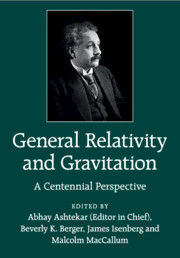Part One - Einstein's Triumph
Published online by Cambridge University Press: 05 June 2015
Summary
Introduction
Recent media attention to the centenary of the outbreak of the First World War (WWI) reminds us that it was against this backdrop that Einstein, a Swiss citizen, announced the revolutionary theory of general relativity (GR). The war affected the theory's dissemination. Eddington's report introducing GR to the English-speaking world[1] relied on information from de Sitter in neutral Holland. Inevitably, the theory's adherents were caught up in the conflict, most notably Karl Schwarzschild, who died in 1916 while serving on the Russian front.
In 1915 Einstein was already a decade on from his annus mirabilis of 1905, in which he had announced the theory of special relativity, explained the already well-observed photoelectric effect as due to quantization of light (a vital step towards quantum theory), and explained Brownian motion assuming the reality of atoms, an explanation experimentally confirmed by Perrin in 1908. The second of these three great papers won him the 1921 Nobel prize – and they were not all he published that year! For example, he published the famous E = mc2 equation, which later gave the basis of nuclear fusion and fission (whence Einstein's intervention in the development of atom bombs). Fusion in particular explained how stars could hold themselves up against gravity as long as they do. So Einstein had already triumphed well before 1915.
However, he was aware that his work left an awkwardly unresolved question – the need for a theory of gravity compatible with special relativity that agreed with Newton's theory in an appropriate limit. Here we will not recount Einstein's intellectual development of general relativity, which resolved that problem, nor describe the interactions with friends and colleagues which helped him find the right formulation. Those are covered by some good histories of science, and biographies of Einstein, as well as his own writings.
- Type
- Chapter
- Information
- General Relativity and GravitationA Centennial Perspective, pp. 1 - 9Publisher: Cambridge University PressPrint publication year: 2015



